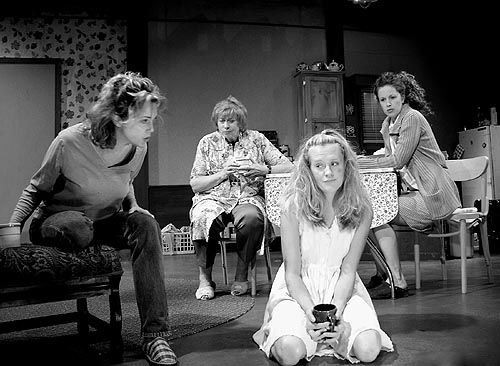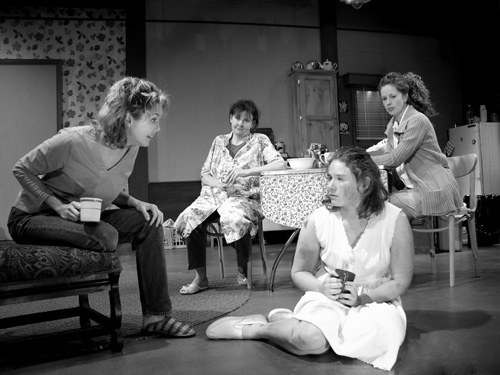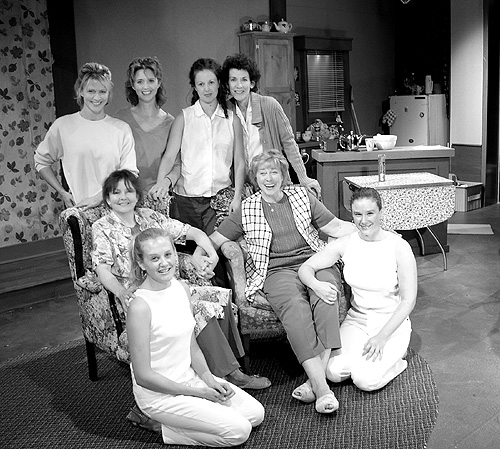Bold Girls contrasts the
every-day world of Belfast women with the ongoing troubles in Northern
Ireland and finds parallels with our own lives. In Munro's acutely
observed terms, these women are at once alienating, warm and funny. Their
eloquent dialogue moves from the lyrical to the banal as Munro illustrates
the effects of violence on the people who must endure it.

L-R: Julia Campbell, Jennie O'Hara, Stephanie Childers &
Kirsten Potter

L-R: Marguerite MacIntyre, Amelia White, Kerrie Blaisdell &
Kitty Swink

Back Row, L-R: Marguerite MacIntyre, Julia Campbell,
Kirsten Potter & Kitty Swink
In Chairs, L-R: Amelia White & Jenny O'Hara
Kneeling, L-R: Stephanie Childers & Kerrie Blaisdell
Click on the pictures to see them larger
REVIEWS
L.A. Weekly - a “wonderful,
bitterly lyrical ensemble piece.” (Erin Aubrey Kaplan)
L.A. Times - November 5, 2004
Belfast 'old Girls' who persevere
by F. Kathleen Foley
Scottish-born playwright Rona Munro taps a rich vein of Irish gallows
humor in "Bold Girls," now at the Matrix.
The play is set in 1990 Belfast, when British raids and retaliatory
bombings were near-daily occurrences. The characters, spunky Irish women,
soldier on in the absence of their menfolk, mostly dead or incarcerated.
Munro artfully mingles the pedestrian and the profound in her
slice-of-life drama, which is alternately wrenchingly funny and just plain
wrenching. A few transitional blips -- abrupt segues in scenes and tone --
lend the piece an occasionally jolting, episodic quality, but director
Lisa James and her stellar cast vault over those irregularities with
dexterity and grace.
As with all Matrix offerings, the production, in repertory with Martin
Crimp's "Dealing With Clair," is double-cast. Kirsten Potter (who shares
the role with Kitty Swink), is Marie, the moral center of the piece, a
widow who idealizes the memory of her slain husband in defiance of
reality. Unvarnished and matter-of-fact, Potter effectively underplays her
stalwart character, who is shortly due for a rude awakening.
In the most visceral turn of the evening, Julia Campbell (alternating with
Marguerite MacIntyre) shines as Cassie, Marie's best friend, a desperate
yearner whose fantasies of escape have led her into sordid compromise.
Hilarious yet rigorously truthful in her portrayal, Jenny O'Hara
(alternating with Amelia White) nails Nora, Cassie's mother, a feisty
survivor whose wishes for the future don't extend beyond her plans for new
draperies. Tough yet effectively tremulous, Stephanie Childers
(alternating with Kerrie Blaisdell) plays Deirdre, the mysterious
woman-child who, in concert with Cassie, finally puts the lie to Marie's
obdurate illusions.
Intrepid travelers through the valley of the shadow, the women shore up
their tragically disrupted lives with tea, booze and female bonding.
Despite its sometimes desultory nature, Munro's is a bold, timely play,
and James is a formidable interpreter whose staging never falters.
BackStage West - November 4, 2004
by Jennie Webb
It's always nice to see so many lovely details onstage. Leave it to the
Matrix Theatre Company, with its practice of mounting material in
repertory for a grand group of performers and double-casting the plays for
both practical and artistic reasons. Interesting fragments abound in Rona
Munro's Bold Girls, a 1991 drama focusing on four working-class
women in war-torn Belfast. In its West Coast premiere under Lisa James'
crack direction, the play has a cast - well, presumably two - to be
reckoned with...
Bold Girls centers on Marie (Kirsten Potter), a widow with two
small children who navigates her difficulties by hanging on to her
super-glued smile and with a strength that comes from the untarnished
memory of her husband, Michael. Her close companions are the wisecracking
Cassie (Julia Campbell) and Cassie's mother, Nora (Jenny O'Hara), women
with opinions who don't hold back in expressing them or in doing what it
takes to get what they need. Against a soundtrack of helicopters and
gunfire and reports of burning buses, the trio grieves for its respective
men and marriages and living room furniture. Then into this world comes
the specter of Deirdre (Stephanie Childers), a bruised waif who spouts the
poetry of war and violence, and violates the sanctity of their collective
denial.
...with snatches of inspirational writing and nicely drawn characters,
Bold Girls remains an attractive vehicle for great actors. James'
fine-tuning direction serves the material well. And the company finds its
way through a whole lot of yelling and screaming to arrive at moving,
distinctive, and ultimately powerful portrayals, which are quite often
united by Potter's absolutely terrific work.